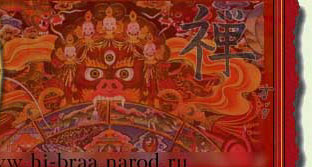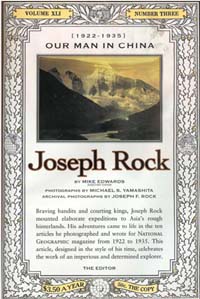 |
|||||
 |
 |
 |
 |
 |
 |
 |
 |
 |
|||
 |
 |
 |
|||
 |
 |
 |
 |
||
[ Увлечения / Тибет / Переводы статей "National Geographic" ]

- Япония: иероглифы, японская письменность, каллиграфия (мои работы), средневековые трактаты.
- Тибет, Непал: тибетская письменность, переводы статей журнала "National Geographic".
- Индия: санскрит, Веды.
- Буддизм: мандалы, тханка, мантры, ароматы.
Статьи:
"Our man in China" (перевод)
"Nepal's forgotten corner - Mustang"

|
|
"Our man in China"
Editor Mike Edwards.
Photographs Michael S. Yamashita.
Archive photos Joseph F. Rock.
ROCK WAS DRAWN то CHINA as a boy, learning to read a bit of Chinese by studying on his own in a Vienna museum. As an adventurer he was intrigued by the cultures of China's minority peoples and relished the prospect of plunging into its forbidding mountains-of being "the first, white man who. . . ."
Inevitably, however, on his months-long journeys he became disgusted with China's chaos and corruption and with its "miserable comfortless towns" and "opium sots," as he called the many addicts.
He vowed many times to leave China forever, and indeed he did depart several times. But he kept going back. Like a man without a country, he found that he was also repelled by "automobile-mad America" and the "so-called civilized world." He wrote in 1930: "I have lived on excitement for the last ten years and a humdrum existence is next to unbearable to me."
When visiting GEOGRAPHIC headquarters, he would wander down to the office of a sympathetic illustrations editor and pour out his homesickness for the mountains of Yunnan. He saw them last in 1949, when, with the communist takeover imminent, he departed for good, after 2 7 years. Rock, who died in 1962, would be enormously pleased that he is still remembered in the village of Nguluko, in Yunnan Province in southwestern China, where he made his headquarters in 1922 and resided off and on until 1949.
When I went to the village last year, every oldster I talked to recalled Luo Boshi, as they still call him. "Luo" is the approximation of Rock, since the ro sound is difficult for some Asians to pronounce. "Boshi" means doctor-an honorific he liked and which even found its way into the GEOGRAPHIC, despite Rock's lack of formal education.
The villagers are Naxi, a Tibetan-related people with their own language, numbering about 275,000 in Yunnan today. They are slightly darker than the Chinese and are often tall. Some of the Naxi (also spelled Nashi, Nakhi, and Na-Khi) who were hired by Luo Boshi for his caravan journeys were taller than their employer, who stood five feet eight inches.
Rock won the loyalty of many by treating their illnesses. "When my great-grandmother was very sick, Luo Boshi gave her some medicine, and she recovered," declared Li Congguang, who lives in a house that Rock occupied. "That is the main reason all my family helped Luo Boshi in his work."
Another man, 75-year-old Li Shijun (most of the villagers that I met had the surname Li) said Rock enabled him to avoid being forced into Chiang Kai-shek's army in the 1940s. Rock looked contemptuously upon that corrupt regime, just as he abhorred the communists. When soldiers came to take away the young men from the village, Rock hid Li Shijun in his own house, probably as a favor to the young man's older brother, a Rock bodyguard.
Several villagers still cling to things that Luo Boshi brought to their families from the U.S. or left behind when he departed. A saw and chisels, for example, and even dental tools. Still used by a villager who practices rough-and-ready dentistry, the dental pliers have by now extracted hundreds of local teeth. I hoped I might discover Rock's rubber bathtub. But when I asked about it, the villagers responded with blank stares.
GULUKO'S plain houses of wood and stone cluster beneath the towering Yulongxue Shan-Jade Dragon Snow Range. The village has changed little since Rock's day, although it is now called Yuhu, Jade Lake, for a nearby body of water. It was summer when I went there, and in the fields women, along with a few men, were bent at the waist, scything grain. Rock had noted that women did most of the daily labor; a Naxi tradition that survives today. o Rock's first article as GEOGRAPHIC expedition leader was about the Naxi dongbas, shamanistic priests who conducted fantastic rituals-dancing, leaping into bonfires, dipping hands into burning oil - to drive evil spirits from a sick person.
Soon he began to translate ancient picto-graph manuscripts that recounted the Naxi history and described their religious beliefs and rites, which are rooted in the ancient Bon traditions of Tibet. In this he relied heavily upon dongbas, for only those shamans had learned to read the pictographs.
Eventually, supported in part by Harvard University, he completed two copiously footnoted Naxi histories and a 1,094-page Naxi dictionary.
"What Rock did was very important," emphasized Yang Fuquan, a Naxi specialist in the Yunnan Academy of Social Sciences in Kunming, the provincial capital. "Today we can't get information like he got from those passed-away priests."
The Naxi culture suffered greatly during the Cultural Revolution, 1966-1976, when Naxi religious practices were banned and shamans were outlawed.
But in the more relaxed China of today scholars want to explore that culture, and officials say the Naxi may return to their old beliefs if they wish. Rock's efforts to record Naxi lore are reckoned so important that Yunnan plans to erect a memorial to him.
| <<< | | 1 | 2 | 3 | 4 | 5 | | >>> |